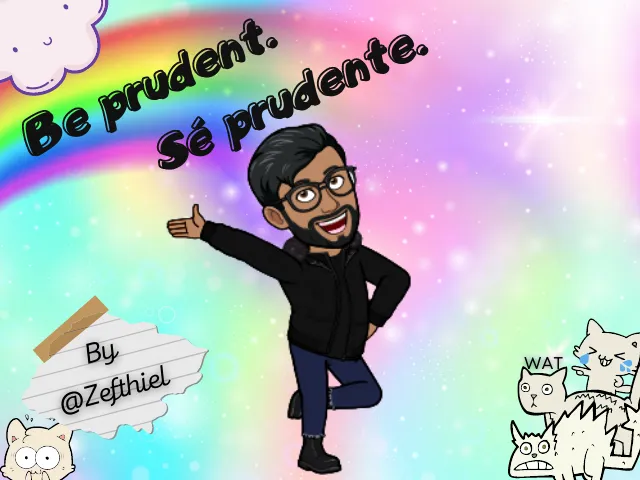


La imprudencia | The imprudence
Seguramente alguna vez hemos conocido a una persona súper imprudente que ha metido la pata en diversas oportunidades, en más de una ocasión en diferentes y pintorescas maneras, algunas incómodas, otras con resultados terribles, no será la primera ni la última vez que veamos saliendo de la boca de otras personas semejantes calamidades, por este motivo considero que la imprudencia es un tema que a mi parecer debe tocarse más, pues es un problema que pocas veces es debatido, que puede mal interpretarse de diferentes maneras, a muchos nos ha afectado en nuestra vida social.
Surely at some time we have met a super reckless person who has messed up on several occasions, on more than one occasion in different and picturesque ways, some uncomfortable, others with terrible results, it will not be the first or the last time we see such calamities coming out of the mouths of other people, for this reason I believe that recklessness is a topic that in my opinion should be touched more, because it is a problem that is rarely discussed, which can be misinterpreted in different ways, many have affected us in our social life.



For the demonstration of this point, I will use a harmless dialogue:
(Here we have a student named Hector, he is 23 years old and to the ironic surprise he is bad at numbers, on the other hand, Julian is 53 years old, he is an excellent professor of mathematics in another university different from Hector's and he is phenomenally good at being a full time job).
On any given morning, three people meet in a park.
Hector: — Hello Julian, how are you doing? — He raises his hand in greeting.
Julian: — Hey, I'm really glad to see you. — shakes his hand, returning the greeting.
Hector: — Yes, right? We haven't seen each other since that conference. —
Julian: — Right, quite a while. —
Hector: — I'm glad you came to help me, I'm a bit desperate, I'm having problems with my Math II class and I wanted you to guide me with some formulas that are really in Chinese for me... — Somewhat late, Hector notices that behind Julian there is a young girl, with a nice appearance.
Julian: — I want to introduce you to Patricia, she's with me, she's... —
Hector: — Ah, hello, what a pretty girl, I didn't know you had brought your niece, what a pleasure! — in an awkward way, Patricia smiles at him as best she can.
Julian: — She is not my niece, Héctor, she is my girlfriend. —
Hector: — Ah... your girlfriend... c-clearly. — To his surprise, Julián doesn't hide his surprise, it's worth the redundancy.
You should not be surprised when they tell you that imprudent people are not aware of the information that comes out of their mouths, what's more, this action can go unnoticed, the person in question does not realize that he/she commits harm, all this is triggered at inopportune moments, that is, in addition to the imprudent subject carrying the information (or none at all) an inopportune situation involving everything that can go wrong is added to the formula, the real recipe for disaster.
"Anything that can go wrong, will."
-John Sack, 1952.
Hector: — Ah, sorry, it's just that the other day I saw that on your Instagram you posted a picture of your niece, and I thought it was her. —
Julian: — She was my daughter, I don't have nieces. —
Hector: — Oh, well I guess I got confused, by the way Patricia, his daughter is very pretty, you should meet her, she looks a lot like her mother and I think she dances ballet. —
Patricia: — Yes, I am her ballet teacher. — * she smiles an uncomfortable smile.
Hector: — Ah, no wonder, you dancers are very pretty, that explains a lot of things, no wonder the teacher noticed you, when I'm old I'd love to have the same luck as you, my friend. — watches Hector with a smile.
Julian: — Ehm, well, we are in a bit of a hurry, we can start explaining the formulas right away, I'm sure you also have a lot of things to do. —
Para la demostración de este punto, usaré el siguiente inofensivo diálogo:
(Aquí tenemos a un estudiante llamado Héctor, tiene 23 años y para la sorpresa irónica se le dan mal los números, por otro lado, Julián tiene 53 años, es un excelente profesor de matemáticas en otra universidad distinta a la de Héctor y se le da fenomenal ser un trabajar a tiempo completo.)
En una mañana cualquiera, tres personas se encuentran en un parque.
Héctor: — Hola Julián ¿Cómo vas? — Alza su mano en saludo.
Julián: — Hey, me alegra mucho verte.— estrecha su mano, devolviendo el saludo.
Héctor: — ¿Si, verdad? No nos hemos visto desde aquella conferencia. —
Julián: — Cierto, bastante tiempo. —
Héctor: — Qué bueno que viniste a ayudarme, estoy algo desesperado, tengo problemas con la clase de matemáticas II y quería que me orientaras con algunas fórmulas que de verdad están en chino para mí… — Algo tarde, Héctor se percata que detrás de Julián se encuentra una Jovencita, con un aspecto agradable.
Julián: — Quiero presentarte a Patricia, ella anda conmigo, ella es… —
Héctor: — Ah, Hola, qué chica más guapa, no sabía que habías traído a tu sobrina ¡Un placer! — De forma incómoda, Patricia le sonríe cómo puede.
Julián: — No es mi sobrina, Héctor, es mi novia. —
Héctor: — Ah… tu novia… c-claro. — Para su sorpresa, Julián no disimula su sorpresa, valga la redundancia.
No debes sorprenderte cuando te dicen que las personas imprudentes no tienen conciencia de la información que sale de sus bocas, es más, esta acción puede pasar desapercibida, la persona en cuestión no se da cuenta de que comete un daño, todo esto se desencadena en momentos inoportunos, es decir, además del sujeto imprudente portador de la información (o de ninguna) se le añade a la fórmula una situación inoportuna que involucra todo lo que puede salir mal, la auténtica receta para el desastre.
"Todo lo que pueda salir mal, pasará."
-John Sack, 1952.
Héctor: — Ah, disculpa, es que el otro día vi que en tu Instagram publicaste una foto de tu sobrina, y pensé que era ella. —
Julián: — Ella era mi hija, yo no tengo sobrinas. —
Héctor: — Oh, pues creo que me confundí, por cierto Patricia, la hija de él es muy linda, deberías conocerla, se parece bastante a su madre y creo que baila ballet. —
Patricia: — Sí, yo soy su profesora de ballet. — esboza una sonrisa incómoda.
Héctor: — Ah, con razón, ustedes las bailarinas son muy lindas, eso explica muchas cosas, con razón el profe se fijó en ti, cuando sea viejo me encantaría tener tu misma suerte, amigo. — observa a Hérctor con una sonrisa.
Julián: — Ehm, bueno, estamos un poco apresurados, podemos comenzar a explicarte las fórmulas de inmediato, seguro que tú también tienes muchas cosas por hacer. —



| Implications |
Sometimes we may feel the need to say all the things that go through our head, as if there was no such thing as a traffic light on a jam-packed freeway, some people even say that it is just "spontaneity or sincerity" or that it is part of the personality, justifying such actions.
"My freedom ends where that of others begins."
-Jean Paul Sartre
Usually, recklessness comes hand in hand with partial or absolute ignorance that we made a mistake, we don't know why it was that such a person stopped chatting with us after we had that talk that we thought was great, but in reality what happened was that we mentioned a topic that was sensitive for that person and he/she preferred to keep quiet for the rest of the talk.
Maybe for us talking about certain topics is not a big problem, but for other people this can be very different, a personal opinion that seems simple for you, can activate painful and terrible psychological processes for another person, either because you have experienced first hand the phenomenon you want to talk about and it generated anxiety, stress or simply because of sensitivity.
This can be explained according to the laws of human subjectivity, people tend to give opinions on issues without the necessary prior knowledge, and by doing so our language ceases to be objective. And even so, if we had all the relevant information anyway the social dynamics and the talks become subjective, as already mentioned language is directly related to thoughts, therefore, it is quite frequent that sometimes we say things without reflecting, that we overlook the moment, the situation and the people involved.
If you really want to avoid personal problems, it is best to save yourself headaches and unnecessary grief, the key is in knowing exactly who we can talk to about these issues, opinion is a powerful weapon, it can convince other people but it can also hurt them irreparably.
| Implicaciones |
A veces podemos sentir la necesidad de decir todas las cosas que pasan por nuestra cabeza, cómo si no existiera un semáforo en una autopista llena a tope, incluso algunas personas dicen que sólo se trata de “espontaneidad o sinceridad” o que forma parte de la personalidad, justificando dichas acciones.
"Mi libertad se termina donde empieza la de los demás."
-Jean Paul Sartre
Por lo general, las imprudencia viene de la mano con el desconocimiento parcial o absoluto de que cometimos un error, no sabemos por qué fue que tal persona dejó de charlarnos luego de que tuvimos aquella charla que pensábamos que fue estupenda, pero en realidad lo que ocurrió fue que mencionamos un tema que era delicado para esa persona y prefirió callarse durante el resto de la charla.
Quizá para nosotros hablar de ciertos temas no sea gran problema, pero para otras personas esto puede ser muy diferente, una opinión personal que parezca simple para ti, puede activar procesos psicológicos dolorosos y terribles para otra persona, ya sea porque se ha vivido de primera mano aquél fenómeno que se quiere tratar y le generó ansiedad, estrés o simplemente por sensibilidad.
Esto se puede explicar de acuerdo a las leyes de la subjetividad humana, las personas tendemos a dar opiniones sobre temas sin el conocimiento previo necesario, al hacerlo de esta manera nuestro lenguaje deja de ser objetivo. Y aun así, si tuviéramos toda la información pertinente de todas formas la dinámica social y las charlas se tornan subjetivas, como ya se ha mencionado el lenguaje está directamente relacionado con los pensamientos, por ende, es bastante frecuente que a veces digamos las cosas sin reflexionar, que pasemos por alto el momento, la situación y las personas que están involucradas.
Si realmente quieres evitar problemas personales, lo mejor es ahorrarse dolores de cabeza y penas innecesarias, la clave está en saber exactamente con quién podemos hablar sobre estos temas, la opinión es un arma poderosa, puede convencer a otras personas pero también puede herirlas de forma irremediable.

| The art of keeping silent. |
To all this, we could define then that the art of knowing how to shut up consists of delimiting what we want to say, using the right words at the right time, selecting them carefully, in addition to this, it is also very important that we are clear about the type of people we are dealing with, because different people require different topics, the topics of conversation will always depend on the people, with some we can talk about certain topics while with others we can not.
At this point you will surely have one or two questions about this, I will try to answer the most frequent and general ones.
The first step to avoid being reckless is to identify at what time we were reckless and in what way, it is common that after the event we feel regret, guilt or wish with all our strength to travel to the past to try to remedy it (or beat ourselves up, whatever.)
We must pay more attention to those feelings of regret and repentance because many times (more than you think) these feelings are avoided or displaced from our mind, they tend to be deposited in an imaginary trunk with invisible chains in some corner of dead memories, this step is essential, because the rest of the process to improve will depend on it.
Human beings evolve in their constant search for perfection of language style, it's a progressive training Why not start at once? Besides, it's not impossible, it's just a matter of practice, people who are good at public debate and those in social communication get better at it so that their programs and jobs are successful.
A) With what intention or objective do we say things?
I will give a brief explanation of each of these elements, in the first place we must always ask ourselves "What is my intention in saying this that I want to communicate?" the reasons will always be varied, any objective is valid as long as it is an objective that comes from our will, it is necessary to know it a priori, in most cases reckless people are not clear about these intentions.
B) The how?
To know what to say and to know what to keep silent we must be concerned about how to say things, this is essential, it is not about keeping silent necessarily, it is about selecting the words carefully and thinking them twice, we must take care of the intonation, the articulation, the rhythm, the volume and the content.
C) When and where...?
Imagine you are at a family gathering and you decide it would be fun to comment on a gossip or a secret of another person who is not present, in that place are 6 or more members of your family, all heard you loud and clear.
In a place where the public dominates: What makes you think that these people will keep the secret? How can you be sure? If you mentioned it, they can too, can't they? And if you make everyone present swear not to say anything about it anyway, how can you force them not to? The short answer is a "you can't" Public domains are like that, words in that place are free and will fly like a balloon in the sky, they will never come back into your hands again.
If I may make a suggestion, it would be to avoid gossip, we save ourselves enormous social stress, just say publicly a magical "I don't know", as follows:
Another person: — Do you know if Pedrito is a thief? —
You: — No idea, as far as I know, he has never stolen from me. —
Other person: — Hey, I've been told that your friend's wife is dating someone else and is unfaithful. What do you know about that? —
You: — I've never seen her dating someone else, really I don't know. —
See, it's wonderful to use "I don't know." Telling secrets or gossip automatically transforms you into an untrustworthy person, but thanks to those magical words we can escape from any gossipy situation in a simple and stylish way, this is the behavior of a prudent person.
D) With whom...?
Talking too much giving the illusion that we know everything is in bad taste, it makes us look reckless especially when the person who listens or reads us does not know us, to avoid these biases, it is essential that we know how to discriminate with whom we talk about certain topics, with your best friend you can be gossipy, with your partner you can be childish, and so on.
| El arte de saber callar. |
A todo esto, podríamos definir entonces que el arte de saber callar consiste en delimitar lo que queremos decir, usando palabras correctas en un momento correcto, seleccionándolas de forma cuidadosa, además de esto, también es muy importante que tengamos claro el tipo de personas que estamos tratando, pues personas diferentes requieren de temas diferentes, los temas de conversación siempre van a depender de las personas, con unas podemos hablar de ciertos temas mientras que con otras no.
En este punto seguramente tendrás una o dos preguntas al respecto, intentaré responder las más frecuentes y generales.
El primer paso para evitar ser imprudente es identificar en qué momento lo fuimos y de qué forma, es común que luego del acontecimiento sintamos pena, culpa o deseemos con todas nuestras fuerzas viajar al pasado para intentar remediarlo (o golpearnos a nosotros mismos, lo que sea.)
Debemos prestar más atención a esos sentimientos de pesar y arrepentimiento pues muchas veces (más de lo que se cree) estos sentimientos son evitados o desplazados de nuestra mente, tienden a ser depositados en un baúl imaginario con cadenas invisibles en algún rincón de las memorias muertas, es fundamental este paso, porque de él dependerá el resto del proceso para mejorar.
El ser humano evoluciona en su búsqueda constante de la perfección del estilo de lenguaje, es un entrenamiento progresivo ¿Por qué no comenzar de una vez? Además, no es imposible, es sólo cuestión de práctica, las personas que son buenas en el debate público y las que se dedican a la comunicación social mejoran en este aspecto para que sus programas y trabajos sean exitosos.
A) ¿Con qué intención u objetivo decimos las cosas...?
Daré una breve explicación de cada uno de estos elementos, en primera lugar siempre debemos preguntarnos “¿Cuál es mi intención al decir esto que quiero comunicar?” las razones siempre serán variadas, cualquier objetivo es válido siempre y cuando sea un objetivo que provenga de nuestra voluntad, es necesario conocerlo a priori, en la mayoría de los casos las personas imprudentes no tienen claras estas intenciones.
B) ¿El cómo...?
Para saber lo que hay que decir y saber lo que hay que callar nos debemos preocupar por el cómo decir las cosas, esto es primordial, no se trata de guardar silencio necesariamente, se trata de seleccionar las palabras con cuidado y pensarlas dos veces, debemos cuidar la entonación, la articulación, el ritmo, el volumen y el contenido.
C) ¿El cuándo y en dónde…?
Imagina que estás en una reunión familiar y decides que sería divertido comentar un chisme o un secreto de otra persona que no está presente, en ese lugar se encuentran 6 o más miembros de tu familia, todos te escucharon fuerte y claro.
En un lugar dónde domina lo público: ¿Qué te hace pensar que esas personas guardarán el secreto? ¿Cómo lo aseguras? Si tú lo mencionaste, ellos también pueden, no? Y si de todas formas les haces jurar a todos los presentes que no deben decir nada al respecto, cómo puedes obligarlos a que no lo hagan? La respuesta corta es un "no puedes" Los dominios públicos son así, las palabras en ese lugar son libres y volarán como un globo en el cielo, jamás regresarán a tus manos de nuevo.
Si se me permite hacer una sugerencia, sería el de evitar los chismes, nos ahorramos un estrés social enorme, basta con decir públicamente un mágico “no lo sé”, de la siguiente forma:
Otra persona: — ¿Sabes si Pedrito se dedica a robar?—
Tú: — Ni idea, que yo sepa, él nunca me ha robado.—
Otra persona: — Hey, me han dicho que la esposa de tu amigo sale con otra persona y le es infiel ¿Qué sabes de eso? —
Tú — Nunca la he visto saliendo con otra persona, de verdad no sé.—
¿Ven? Es maravilloso usar el “no lo sé.” Contar secretos o chismes te transforma automáticamente en una persona no confiable, pero gracias a esas mágicas palabras podemos escaparnos de cualquier situación chismosa de manera sencilla y con estilo, esta es la conducta de una persona prudente.
D) ¿Con quién…?
Hablar demasiado dando la ilusión de que lo sabemos todo es de mal gusto, nos hace ver imprudentes especialmente cuando la persona que nos escucha o nos lee no nos conoce, para evitar estos sesgos, es imprescindible que sepamos discriminar con quién hablamos de determinados temas, con tu mejor amigo puedes ser chismoso, con tu pareja puedes ser infantil, y así sucesivamente.



| Reflection |
There is a mistaken belief that we have the implicit right to criticize other people's lives in a negative way, it is enough to look in the mirror from time to time to demolish that belief and refresh the memory that we are not perfect.
If you have ever wondered about how you can remove a bad impression of yourself from other people's minds, you may have come to the conclusion that it is difficult, if not almost impossible, so if we want quality friendships, a good relationship or a good job, we need to pay attention to how we speak.
What comes out of our mouth no longer belongs to us, but still represents who we are, the words that come out of our mouth give an image of us, this can affect how other people see us. We can make other people see us in certain ways, gossipy, aggressive, quiet, confident, reserved or joking, fortunately this can be controlled.
Taking care of our words also takes care of us from the words of others. If you are a person who has never been seen to criticize others, you will be seen as the bearer of impeccable judgment, in any aspect and circumstance.
Let us be prudent!
| Reflexión |
Existe una creencia errada de que tenemos el derecho implícito de criticar de forma negativa la vida de otras personas, basta con mirarnos en el espejo de vez en cuando para derrumbar esa creencia y refrescar la memoria de que no somos perfectos.
Si alguna vez te preguntaste sobre cómo puedes quitar de la mente de los demás una mala impresión de ti, quizá hayas llegado a la conclusión de que es difícil, por no decir casi imposible, así que si queremos amistades de calidad, una buena relación de pareja o un buen trabajo, es necesario que nos fijemos en cómo hablamos.
Lo que sale de nuestra boca deja de pertenecernos, pero sigue representando lo que somos, las palabras que salen de nuestra boca dan una imagen de nosotros, esto puede incidir en cómo las demás personas nos ven. Podemos hacer que otras personas nos vean de determinadas maneras, chismosas, agresivas, tranquilas, confiables, reservadas o bromistas, afortunadamente esto se puede controlar.
Cuidar nuestras palabras también nos cuida a nosotros de las palabras de los demás. Si usted es una persona que nunca ha sido vista criticando a otros, usted será visto como portador de un juicio impecable, en cualquier aspecto y circunstancia.
¡Seamos prudentes!


Si deseas saber más de estos temas, sígueme para leer más al respecto.
Use of Translator: DeepL Translate. (Sorry for my bad English.)
Créditos: El diseño de las imágenes son creaciones originales del autor, con el uso de los siguientes editores: Canva.com, Pixlr.com y Bitmoji.com.

